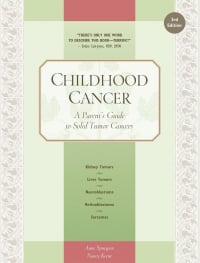Childhood Cancer
Emotions
Parents should anticipate that, after many months or years spent watching their child go through the rigors of active treatment, they may have lost the feeling of a normal life. They may experience relapse scares and may frequently need to call the doctor to describe the symptoms and be reassured.
Every time Sean sneezed, I was there with a thermometer. I was constantly on the lookout for “bad germs.” It took about a year before I was finally able to relax and stop feeling so paranoid.
With diagnosis came an acute awareness that life can be cruel and unpredictable. Many parents feel safe during treatment and feel that therapy is keeping the cancer from coming back. The end of treatment leaves many parents and children feeling exposed and vulnerable. When treatment ends, parents must find a way to live with uncertainty—to find a balance between hope and reasonable worry.
I had a lot of anticipatory worry—it started about 6 months before ending treatment. By the last day of treatment I had been worrying for months, so it was just a relief to quit.
We were thrilled when treatment ended. I knew many people who felt that celebrating would jinx them; they just didn’t feel safe. Well, I felt that we had won a big battle—getting through treatment—and we were going to celebrate that. If, heaven forbid, in the future we had another battle to fight, we’d deal with it. But on the last day of treatment, we were delighted.
Table of Contents
All Guides- Introduction
- 1. Diagnosis
- 2. Bone Sarcomas
- 3. Liver Cancers
- 4. Neuroblastoma
- 5. Retinoblastoma
- 6. Soft Tissue Sarcomas
- 7. Kidney Tumors
- 8. Telling Your Child and Others
- 9. Choosing a Treatment
- 10. Coping with Procedures
- 11. Forming a Partnership with the Medical Team
- 12. Hospitalization
- 13. Venous Catheters
- 14. Surgery
- 15. Chemotherapy
- 16. Common Side Effects of Treatment
- 17. Radiation Therapy
- 18. Stem Cell Transplantation
- 19. Siblings
- 20. Family and Friends
- 21. Communication and Behavior
- 22. School
- 23. Sources of Support
- 24. Nutrition
- 25. Medical and Financial Record-keeping
- 26. End of Treatment and Beyond
- 27. Recurrence
- 28. Death and Bereavement
- Appendix A. Blood Tests and What They Mean
- Appendix B. Resource Organizations
- Appendix C. Books, Websites, and Support Groups


